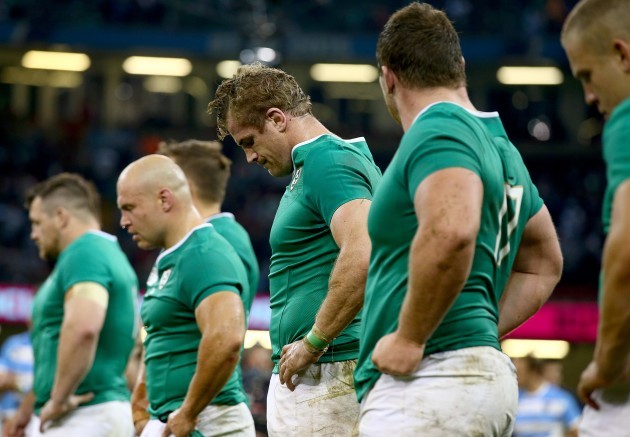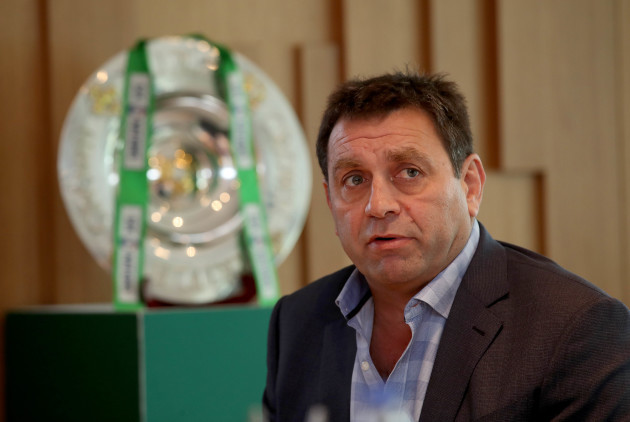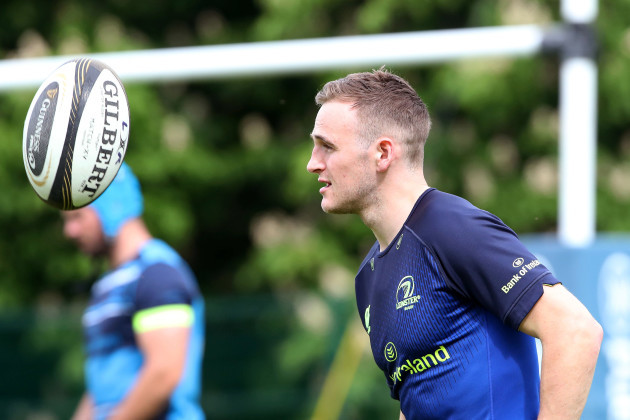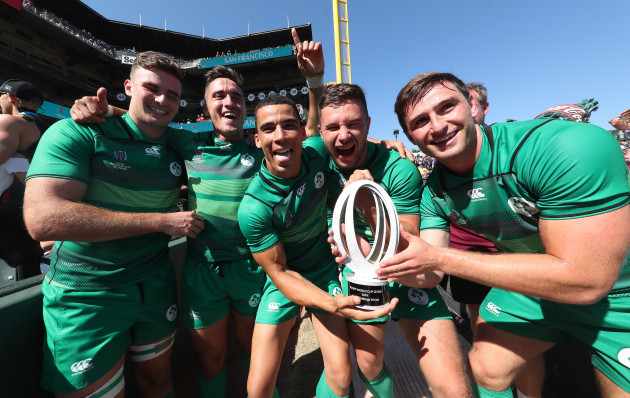IF THE IRFU’S latest strategic plan, launched this morning, is successful, Ireland will have reached the World Cup semi-finals or better in 2019 and 2023.
It would represent new ground for the national men’s team, who have never advanced beyond the quarter-finals.
The IRFU is also aiming for a minimum of two Six Nations titles in the next five years, as well as being consistently ranked in the top three nations in the world.
On the provincial front, the IRFU’s stated aims for 2018 to 2023 are two or more European titles, two or more Pro14 trophies, and for the four teams to be consistently reaching the knock-out stages of the European Cup.
The new strategic plan also includes lofty objectives for women’s rugby, resulting in a separate document that underlines the IRFU’s desire to show they are taking the female side of the game seriously.
A minimum of semi-finals at the next two World Cups does look achievable for the national men’s team, currently ranked second in the world and Grand Slam holders, and with plenty of exciting talent continuing to emerge for the provincial teams.
“We’ve got to be ambitious,” said IRFU performance director David Nucifora. “They’re our minimum benchmarks that we want to achieve, but we want to win everything.
“Every time we roll out, it’s about being the best we can be and winning it. So, we are going to aim to have those minimum benchmarks at World Cups but obviously we want to win them.
“We’re here to win things and that’s what we want to do. That’s what Joe, the staff and everyone is striving to achieve in Japan.
The IRFU is keen that Joe Schmidt will continue to steer the ship as national team head coach beyond the 2019 World Cup, after which his contract is due to expire, but believe Irish rugby is in good enough condition to survive even the Kiwi’s possible departure.
“A lot of the success [in recent years] is down to Joe, he’s driven a lot of really good things in the Irish game and not just with the national team,” said Nucifora.
“Part of his strength is that he’s built a team that can carry those things on, that can carry them forward. Any good programme has to be sustainable. A lot of the work that we do is about that, about being sustainable.
“And regardless of whether Joe chooses to stay or go, he’d be the first one to tell you that he’s confident that it is sustainable. We’ve built something that is sustainable and we will be continuing to focus on that.”
One of the strong reasons for the apparent sustainability of Irish rugby is the fact that young players continue to break into the provincial set-ups and on into the national team.
While Munster, Connacht and Ulster are still producing their own players, there have been a number of moves involving Leinster players shifting to the other provinces in recent times, with Nick McCarthy set to join Joey Carbery at Munster next season.
The IRFU point to the 2.5 million population of Leinster as one of the main reasons the eastern province is producing the most talent.
“What we do have to realise is that 50% of the rugby population and about 50% of the entire population is based in Leinster, so it’s no surprise that Leinster are in the position they are in,” said IRFU CEO Philip Browne.
“They also have this unique advantage of an incredibly vibrant schools scene, so they are almost unique worldwide in terms of the advantages they have.
“There is work that needs to be done in Ulster in terms of player development and there is a whole action plan behind that which the high-performance team will be in there supporting in Ulster and equally with Munster.
“There is great work going on in Connacht but the reality is Leinster is a unique environment.
“Can we recreate that environment in Ulster and Munster? I don’t think we can because it’s different. There are elements of similarity in the schools system in Ulster and it’s how we try and bring that on.
“Munster is difficult in that there are not as many schools, it’s much more club-based so each province is slightly different.
“If you’re asking me are we getting the most out of all four provinces, the answer is probably not. I include Leinster in that – we can better across all four provinces.”
Nucifora has been championing inter-provincial moves since he took up his role with the IRFU in 2014 and again underlined his belief that youngsters like McCarthy are brave for opting to leave their native Leinster.
“It’s about having the best players playing the game, and I think you take your hat off to the young players that have decided to make those moves because they are ambitious,” said Nucifora.
“If you’re going to be a high-performing athlete, then you have to be ambitious. You have to take chances, you have to put yourself out on a limb. And that’s what they’re doing because they want to be the best they can be.”
Munster’s production line has attracted outside criticism, particularly after two young South African players joined the set-up in Limerick straight out of school late last year.
“I don’t think that suggests that it’s failing,” said Nucifora of those signings. “I suggest that it means there was an opportunity for two young boys who wanted to come to Ireland who are good rugby players and we’ve housed them in a system that will allow them to be the best that they can be.
“Now, regardless of that, there is a lot of good talent that is floating around in all the provinces and I think that we have still only scratched the surface of how good Irish rugby can be.
“We’re not satisfied with where we’re at, at the moment, either nationally or provincially.”
Nucifora underlined that all staff working in the development pathways and academies are IRFU employees “that are dressed in provincial colours to deliver programmes that are nationally-coordinated.”
He underlined that the aim of the IRFU, across this five-year strategic plan, is to grow the numbers of players involved in the game, therefore creating more competition for places at each stage of the pathway, resulting in better players for the provinces and Ireland.
The national team will remain the most crucial focus, bringing in 80% of the IRFU’s income as it does.
The provinces account for just 13% of that income, but 39% of the overall expenditure by the union.
As the IRFU continues to strive to produce more players and better players, sevens rugby will remain part of the picture.
Nucifora, who was key to the men’s sevens programme being relaunched in 2015, explained that several academy players will “fluctuate between” sevens and 15s again this season, the hope being that their skill development is accelerated.
The aims for the national men’s sevens teams over the next five years are to qualify for the 2020 Tokyo Olympics, qualify for the World Rugby Sevens Series and finish in the top eight of the series once they’re involved.
Contracts for the men’s sevens team are due to be announced this week and qualification for the World Series could come next year, Ireland having missed out in Hong Kong this year.
“We’ve had some great success in a short space of time pushing players through our sevens programme who have then gone back into the professional game and played 15s at the highest level,” said Nucifora.
“We think we can continue to utilise it in that way and the higher up in the competitive chain we go, which is ultimately the World Series then the Olympics, the higher the level we’re exposing those development players to, the greater the experience and the benefit of their own personal development is going to be when they do play 15s rugby, if that’s what they choose to do.”
Subscribe to our new podcast, Heineken Rugby Weekly on The42, here:




